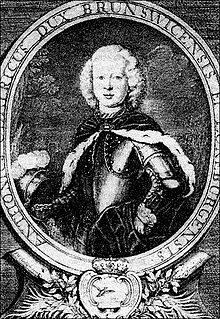Duke Anthony Ulrich of Brunswick
| Anthony Ulrich | |
|---|---|
| Duke Anthony Ulrich of Brunswick-Wolfenbüttel | |
 |
|
| Born | 28 August 1714 |
| Died | 4 May 1774 (aged 59) |
| Spouse | Grand Duchess Anna Leopoldovna of Russia |
| Issue among others... |
Ivan VI of Russia |
| House | Brunswick-Bevern |
| Father | Ferdinand Albert II, Duke of Brunswick-Luneburg |
| Mother | Princess Antoinette of Brunswick-Wolfenbüttel |
Anthony Ulrich (German: Anton Ulrich; 28 August 1714, Bevern – 4 May 1774, Kholmogory), Duke of Brunswick-Lüneburg, was generalissimus of the Army of Russia, and the husband of Anna Leopoldovna, who reigned as regent of Russia for one year.
Anthony Ulrich was the second son of Ferdinand Albert II, Duke of Brunswick-Lüneburg and Princess Antoinette of Brunswick-Wolfenbüttel. His mother's sister, Elizabeth, wife of Charles VI, Holy Roman Emperor, arranged for his marriage to HSH Duchess Elisabeth of Mecklenburg-Schwerin (known as "Anna Leopoldovna"), daughter of Charles Leopold, Duke of Mecklenburg-Schwerin, and granddaughter of Tsar Ivan V; and he was taken to Russia in 1733, so that he and Anna could get to know each other. The marriage took place in 1739. This marriage was intended to strengthen the relationships between the houses of Romanov and Habsburg. In 1740, their infant son, Ivan, became emperor as Ivan VI. Initially, Ernst Biron was regent, but when rumors surfaced that Biron planned on exiling Anthony and Anna to Germany, they staged a coup and Anna was named regent. Not long after, treacherous coup in 1741 removed the family from power.
The new Empress, Elizabeth, had Anthony Ulrich, his wife, and their children imprisoned. They remained so for the rest of their lives. The years of imprisonment were hard, and the family was periodically denied many necessary things. Virtually all communication with the outside world, with the exception of a few servants, was banned. The governor of Arkhangelsk regularly visited them to enquire about their health. In 1762, Catherine offered the Duke permission to leave Russia, with the condition he leave his children behind; but he declined. He lost his eyesight before he died. He was buried very discreetly, and the soldiers were forbidden to reveal the place of his burial, but his coffin was decorated with silver.
...
Wikipedia
